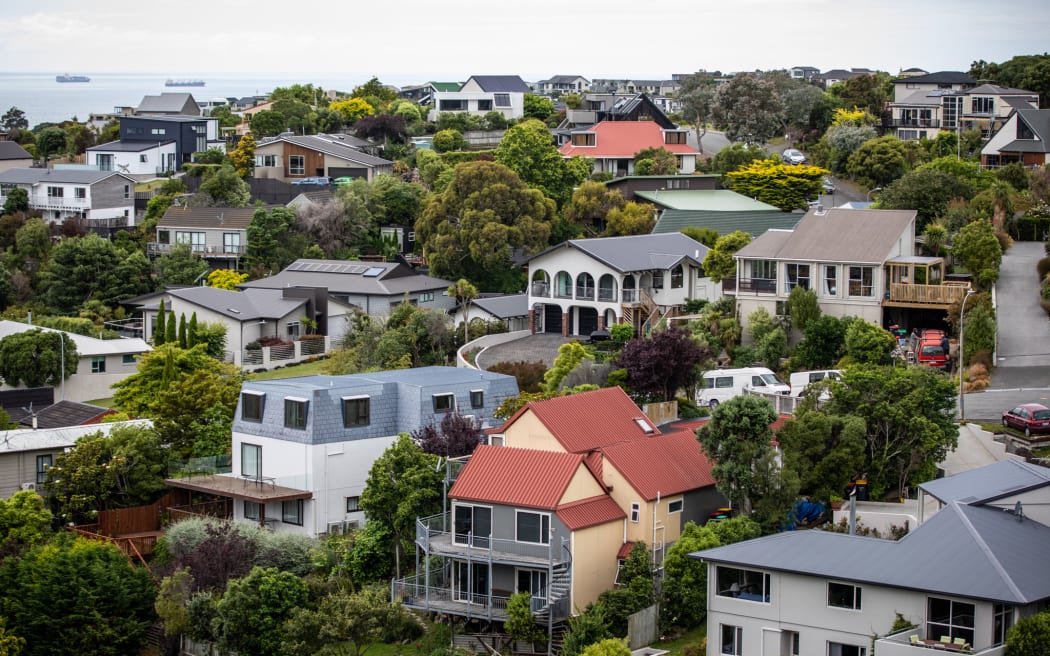If you've got a mortgage, you're probably looking at interest rates with increasing anxiety. The Detail takes a closer look at another side of the housing crisis.

Photo: RNZ / Nate McKinnon
Mortgage.
It's a French word, a portmanteau, meaning 'death-pledge' - and that might ring a bit true if you've taken one out in the past couple of years.
The Reserve Bank's most recent financial stability report paints a bleak picture for first home-buyers: people who bought during the pandemic and elected for fixed-term mortgage rates are in for a rude awakening when the time comes to renew.
And with house prices also falling, for related reasons, some homeowners may find themselves in an unenviable position: owing more than their house is worth, but struggling to keep up with their payments.
The New Zealand Herald's Thomas Coughlan talks to The Detail about the implications for homeowners living on the margins; the factors that have led to this state of affairs; and whether there are any levers that could be pulled.
Fixed versus floating
"A floating rate means your rate floats: it will be subject to the trends of the global economy," Coughlan explains.
"Fixed rates are a way of getting some security over your loan.
"You can fix a rate for a certain period of time. This means you're often paying a premium above that floating rate, because you're getting some security the floaters don't have.
"There are a lot of people at the moment who would've fixed...when the official cash rate was 0.25 percent...and they would be saving a lot of money, because people on floating rates are now paying really high mortgage rates...meanwhile people who fixed are still living in this 2020 world, where mortgage rates are quite low."
The problem, of course, is when people come off these fixed-term rates and have to renew their mortgages. If interest rates have increased substantially, they are going to be paying significantly more of their income to service those mortgages.
"And that's what is happening at the moment."
Could the government step in?
Coughlan says this is an area where it’s unlikely the government will intervene meaningfully.
"You've got to remember there's the misery of people who will never be able to afford homes in New Zealand...who are facing double-digit inflation in their food costs.
"We're trying to kill that right now, and the way to do that is by sucking money out of the economy. You do that by hiking the cash rate, making mortgage repayments, frankly, more expensive. You're taking money out of people's pockets. That's why this is happening."
Has the bubble burst?
Coughlan says this whole saga does raise questions about the complacency with which the housing market seems to have been viewed in the past couple of decades.
"One of the things I think governments have been guilty of is turning a blind eye to the housing crisis because a majority of households do own houses, and it's a great cost-free way of increasing people's incomes and wealth.
"The people who don't own houses are written off politically, not enough of them vote, and if they do they don’t represent enough of a voting bloc to care about. And the people who do have houses are happy, because they're able to borrow more, to go on holiday, and have lots of money.
"We're seeing the flip-side of that.
"New Zealand's been quite ambivalent, until recently, about ludicrous levels of house price growth. We've tolerated levels of house price growth we would not tolerate if they were ordinary consumer inflation. And I think perhaps we will ask questions about the merits of pulling the house price lever to make people very rich, and then to make those very rich people much poorer.
"No one wants to live on a rollercoaster. And New Zealanders have discovered that rollercoasters go up, and then they come down."
Find out how to listen and subscribe to The Detail here.
You can also stay up-to-date by liking us on Facebook or following us on Twitter.

Photo:


